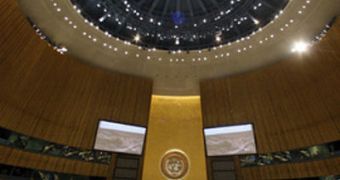This year's UN Climate Summit is undoubtedly the largest event of its kind in human history. For the first time ever, officials from nearly all countries in the United Nations are being joined by their presidents, in a large-scale effort to stop the ruthless effects of global warming, and to mitigate climate change. The meeting started today, with opening statements from a number of important UN officials, as well as from the Prime Minister of Denmark, the nation hosting the Copenhagen summit.
The first statements began in force, drawing attention to the most pressing issues related to global warming – desertification and rises in global sea level. The Danish Prime Minister also highlighted the fact that, for the first time, we had the opportunity to work together to face a common enemy, of our own doing, and added that a compromise and an agreement in this summit were “within reach.” More than 15,000 representatives from 190 countries are attending the talks, the UN reveals.
Lars Lokke Rasmussen also underlined the fact that the greatest challenge of the December 7-18 summit was to get rich and poor nations to come to an agreement, especially given that the latter simply did not have the resources to protect the natural treasures they had, such as pristine landscapes and rain forests. They are asking for money and technology from rich nations, which do not seem very willing to help out. Additionally, the First World countries also need to devise a way of sharing the burden of reducing fossil fuel-related emissions, which were found to be the main source of global warming.
Rasmussen also revealed that, given the large number of world leaders who would be attending a meeting at the end of the summit, this became an opportunity that the world couldn't afford to miss. “The clock has ticked down to zero. After two years of negotiations the time has come to deliver,” the head of the UN Climate Change Secretariat, Yvo de Boer, added. “The evidence is now overwhelming that the world would benefit greatly from early action, and that delay would only lead to costs in economic and human terms that would become progressively high,” the chair of the Intergovernmental Panel on Climate Change (IPCC), Rajendra K. Pachauri, shared.
China, the United States, Russia and India are among the most important states to have already pledged to curb emissions, and their lead may soon be followed by others. Australia was to join this group, but, in a recent blow, its government defeated a proposal that called to direct action against global warming. “The British government is absolutely clear about what we must achieve. Our aim is a comprehensive and global agreement that is then converted to an internationally legally binding treaty in no more than six months. If by the end of next week we have not got an ambitious agreement, it will be an indictment of our generation that our children will not forgive,” British Prime Minister Gordon Brown wrote in The Guardian.

 14 DAY TRIAL //
14 DAY TRIAL //